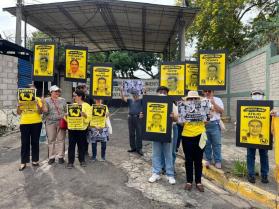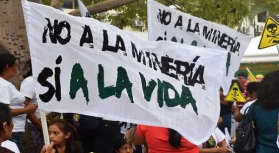The Salvadoran Anti-Terrorism Law and its Mirror Image
by US-El Salvador Sister Cities
Introduction:
October,2006: The Salvadoran LegislativeAssembly approves decree #108, the Special Law Against Acts ofTerrorism. The law is made public andapplicable on November 16,2006. The law re-writesseveral articles of the Salvadoran Penal Code, and creates several newcategories of felonies. Most all of the actsthat are clearly and universally recognized as terrorism (explosives onplanes and buildings, poisoning food and water supplies, etc.) were already coveredin Salvadoran Law. The thrust andnovelty of the new Anti-Terrorism Law is the creation of ambiguous languageand concepts that allow subjective interpretation of events and actions by police,attorneys and judges. María SilviaGuillén, Director in ElSalvador of the Foundation for Studies ofApplied Law, FESPAD, observed that the law creates wildcards that allow theconcepts and penalties of the law to be invoked or left aside at any giventime, influenced by any political motive. The language of the law creates several figures that are decidedlyunclear. Lets take a look:
Specifics of the Law:
Briefly,a rundown of the articles in the Special Law Against Acts of Terrorism thatprovide cause for concern:
-
Chapter 3, Article 6: Armed Occupation of Cities, Towns andBuildings. The law indicates that anyone whoparticipates in takeovers or occupation of cities, towns, buildings, privatelots, public areas, diplomatic areas or places dedicated to religious activity,and in doing so use arms, explosives or similararticles and disrupts normal activities in those areas, will be punishedwith 25-30 years in prison. We shouldask ourselves: What are similar articles?. Are they sticks? Chains? Rocks? It is up to police and judges to decide on acase by case basis. What about workersgoing on strike who close the factory doors? What about rural peasants who carry their machetes with them on a marchthrough San Salvadorto demand rural public health services?
The law goes on to specify that anyone whoparticipates or supports the simulation of any of the acts contemplated inthe law, can receive 5-10 years in prison. (Chapter 3, Article 9.)
-
Chapter 3, Article 16:Hostages. Anyone who detains another person with thegoal of obliging the State, international inter-governmental organization orperson to perform a specific action may be punished with 35-45 years injail. At the time that this document waswritten, a coalition of students groups from the University of El Salvadorhas taken over a portion of the campus, closing and locking the gates anddemanding that the university accept 200 more students in the entering freshmanclass. The university maintenancepersonnel and several professors are on the premises. The police are free at any time they chooseto interpret this action as taking a hostage, thus terrorism, or not.
-
Chapter 3, Article 19:Security in Airports. Anyone who in the airportcarries out an action that perturbs in any way the services there providedmay be punished with 15-20 years in prison. This would apply to the recently striking airport workers, CEPA. Perhaps they hadnt considered themselvesterrorists before.
-
Chapter 3, Article 41: Legal Entities: When any of the individuals convicted ofinfractions to the Anti-Terrorist Law pertain to and represent theadministration or directive bodies of any legal organization, the organizationitself can be made to pay a fine of 150,000 500,000 dollars, and be legally disbanded. Again, Salvadoran social movementorganizations take note.
-
Chapter 3, Article 29. Financing of Terrorist Acts. Anyone who through any means direct orindirect provides, collects, or transports funds, or tries to give financial orother services with the intention that they be used totally or partially tocommit any of the criminal conducts described in the law will be punished with20-30 years in prison and a fine of 100,000-500,000 dollars. U.S-El Salvador Sister Cities raises money tosupport CRIPDES social movement organizations to do popular education andmobilization of rural communities to demand their rights. Could we be terrorists? Are you inclined to let René Figueroa, thenew Minister of Public Security (and ideological vice-president of the NationalExecutive Committee of the right-wing ARENA party) decide if you are?
-
Chapter 3, Article 45 Declaration of Undercover Agents andWitnesses: Another change that the Anti-Terrorism Lawmakes to the Salvadoran legal books and penal code is the type of evidenceadmitted. This law allows as admissibletestimony any declaration of undercover agent, victim or witness made throughelectronic means with distortion of voice and image Defendants need not know their accusers orwitnesses.
-
Chapter 3, Article 34. Special Circumstances: Finally, this article of the law allowsmonetary penalties and jail time to be increased by up to 33% if the infractionoccurs with any of a series of conditions that include: acts committed by agroup of 2 or more people, destruction of private or public property, or whenthe goal of the activity is to have an influence in governmental decisions. The law thus directly targets previously legal political advocacyefforts.
Mirror Image:
Doesthe Salvadoran Special Law Against Acts of Terrorism sound at all familiar tothose of us keeping an eye on President Bushs security and privacy policies? Its not the first time that Salvadoransecurity measures are influenced by and drafted from U.S. policy. Starting in the early 80s Salvadoranmilitary personnel were trained in the School Of the Americas. Today, the UnitedStates has installed an International Law EnforcementAgency, ILEA in El Salvadorto train police forces throughout Central America. It is no wonder that this most recent pieceof Salvadoran law takes much of its language and thrust directly from U.S.policy. As the Bush administration isusing anti-terrorism to push through an otherwise hard to swallow agenda, theimplementation of the Anti-Terrorism law in El Salvador should provide all ofus with a glimpse of what is in store (or already happening) in the UnitedStates.
Proposals:
Salvadoransocial movement organizations are working against the Special Law Against Actsof Terrorism by proving its unconstitutionality and by defying the law andcontinuing to work for justice. A broadcoalition of organizations called the Coordination for Peace, Dignity andSocial Justice is preparing a legal attack on the law to show how it is inadmissibleunder the Salvadoran Constitution. Thisdocument will be presented publicly on March 24th of this year, the27th anniversary of the assassination of Archbishop OscarRomero. Simultaneously and unanimously,the Salvadoran social movement will continue to organize, educate and mobilizein the face of the terror that this law creates. And we need to re-create and build networksto support the possible consequences of these actions. Guadalupe Mejía, historic worker for humanrights in El Salvadorand member of COMADRES, Mothers of the Disappeared observed that in the war ifthey captured one of our young people, we all knew what to do and do and do toget them back. Now they are doing thesame things to us as they did in the war. Just because its legal this time doesnt mean that we will let themhave all of our youth.
Prepared by Sister Cities,March 2007

 "I am a CISPES supporter because continuing to fight for social justice and a more people-centered country means continuing the dream and sacrifice of thousands of my fellow Salvadorans who died for that vision.” - Padre Carlos, New York City
"I am a CISPES supporter because continuing to fight for social justice and a more people-centered country means continuing the dream and sacrifice of thousands of my fellow Salvadorans who died for that vision.” - Padre Carlos, New York City

